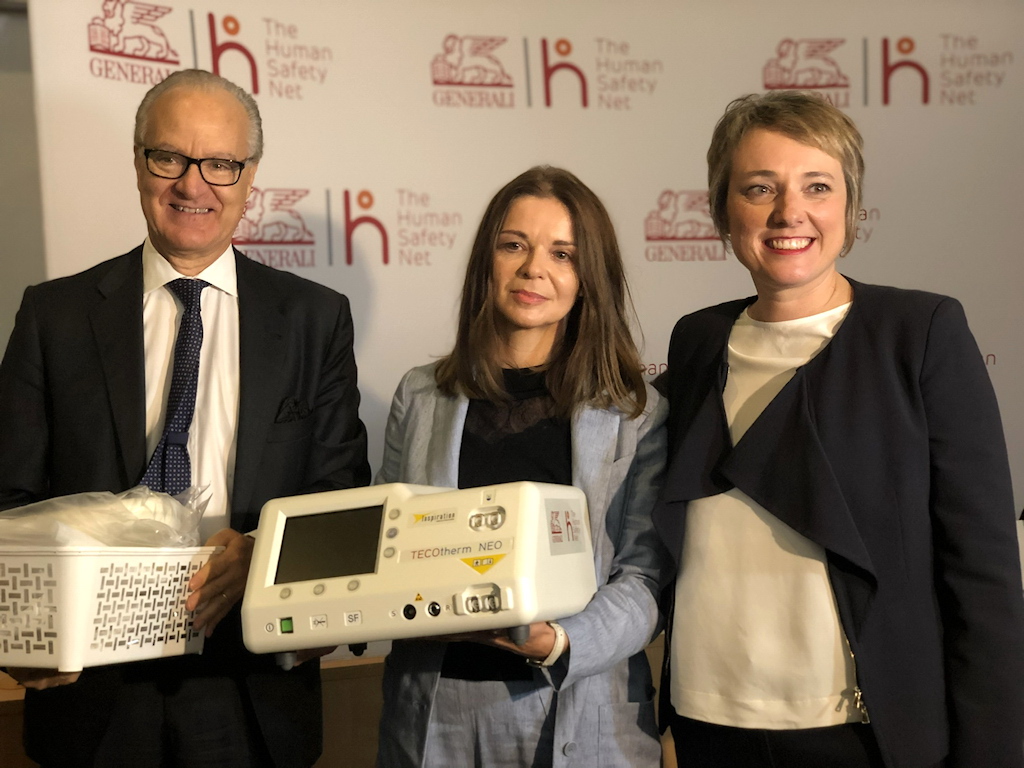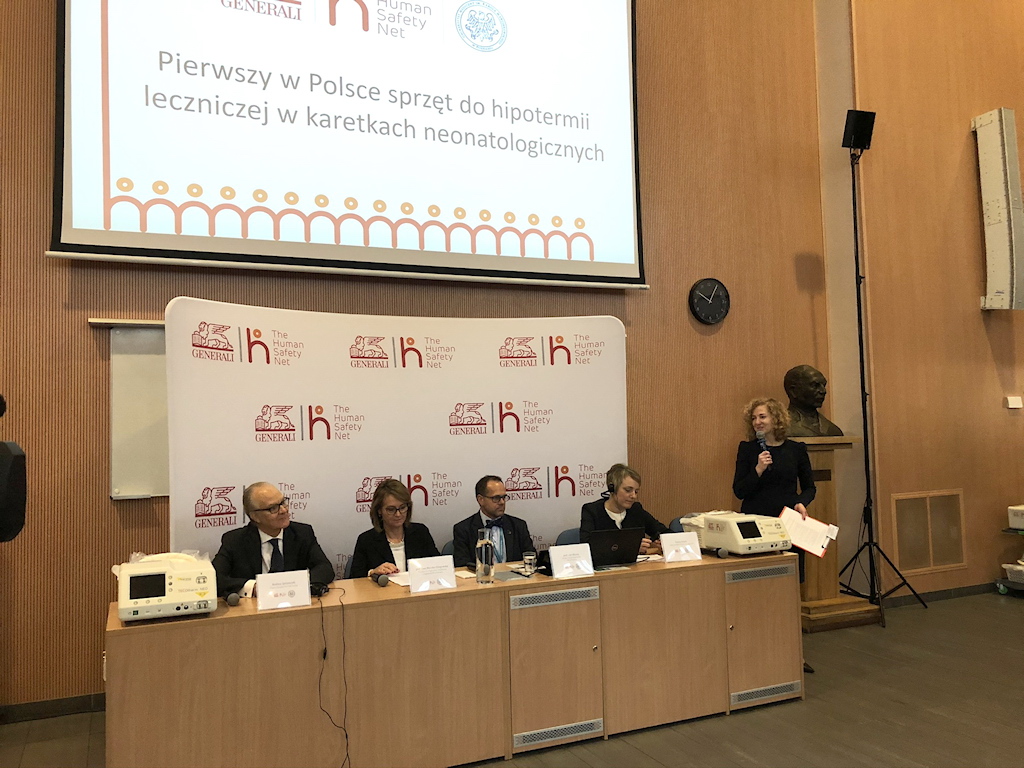Generali and The Human Safety Net foundation are the founders of the first therapeutic hypothermia equipment in Poland in neonatal ambulances
03 October 2019
Thanks to the cooperation of Generali Polska, the Human Safety Net foundation and the Medical University of Karol Marcinkowski in Poznań, the first project in Poland to apply therapeutic hypothermia in neonatal transportation is underway. Newborns with perinatal asphyxia will have a chance to receive treatment during ambulance transportation to a selected medical centre. Specialised equipment for saving health and life of the youngest has already been delivered to ambulances in Poznań, Zielona Góra and Bydgoszcz.

Therapeutic hypothermia, consisting in a controlled lowering of the newborn body temperature, is a globally recognized method of improving the treatment results of children suffering from perinatal hypoxia, i.e. asphyxia. The key to the success of this therapy is to start with the treatment quickly, because if aid is not provided within six hours after birth, changes in the child's brain due to hypoxia are irreversible and can lead to physical and intellectual disability, and in the worst case also to death.
In Poland, therapeutic hypothermia in newborns has so far been used only during hospitalisation in selected centres with the highest reference level (III). In practice, this means that children born in cities distant from these centres must reach a hospital specialised in further therapy within six hours after delivery. The project of using therapeutic hypothermia already during transportation by a neonatal ambulance is a real breakthrough, owing to which newborns will quickly receive the necessary help and treatment, reducing the risk of developmental disorders resulting from asphyxia, including brain damage.
Prof. Jan Mazela, Head of the Neonatal Infection Clinic of the Medical University of Poznań, project coordinator, said: "Perinatal hypoxia is a newborn's respiratory failure that can occur before or during delivery. Therapeutic hypothermia is an effective therapy to prevent the effects of hypoxia. Time matters. The therapeutic window is a maximum of 6 hours from birth, and the sooner we provide the child with treatment, the lower the risk of hypoxia effects, such as cerebral palsy, will be. Meanwhile, in Poland we have a dozen or so centres equipped with appropriate equipment. I am convinced that the implementation of the first systemic therapeutic hypothermia in "N" transportation means a real breakthrough in neonatology in Poland. This is confirmed by clinical studies from other countries taking advantage of this method. I am glad that owing to the cooperation with Generali and the Human Safety Net foundation this breakthrough has become possible.”

The entire project implemented by Generali Polska and the Human Safety Net foundation, whose value is over PLN 300,000, aims to minimise the negative effects of perinatal hypoxia and ischemic encephalopathy. As part of the project, three neonatal ambulances - first ones in Poland - have been equipped with specialised hypothermia equipment for transportation. The devices went to the Gynaecology and Obstetrics Clinical Hospital in Poznan, University Hospital named after Karol Marcinkowski in Zielona Góra and the University Hospital no. 2 named after Jan Biziel in Bydgoszcz. The ambulances are equipped with the Tecotherm Neo device. It is an innovative device adapted to conduct hypothermia during transportation, which conducts ongoing monitoring of the newborn's temperature at intervals of 2 seconds, thanks to which it precisely maintains the newborn's body temperature at a stable level.
Andrea Simoncelli, CEO of Generali Poland: “We are proud that Generali Polska can be part of this unique project. Insurance is not just a business, it is a way of thinking about the world and a social mission. Life and health of others is extremely important to us. Help is also included in Generali's DNA, which is why, together with The Human Safety Net and the Medical University of Poznań, we decided to join forces to help newborns who are born with hypoxia. In Poland, we can do a lot of good in this area and really influence the better future of the most vulnerable - newborns, preventing their disability and even death.”
As part of the cooperation between Generali, the Human Safety Net foundation and the Medical University of Poznań, numerous workshops will also be held as well as trainings for doctors and nurses, the aim of which will be to improve medical care and to introduce the best practices in "N" transportation as well as in obstetric and neonatological departments of Polish hospitals.
Emma Ursich, Director of The Human Foundation Safety Net, commented: “As the Human Safety Net Foundation, we want to support communities in the countries where Generali operates. Today, we are already active in 20 countries in which we cooperate with social organisations, combining the strengths of the social and private sectors. Thanks to our three programmes (For Newborns, For Families, For Refugees with start-ups), we want to have a lasting impact on the lives of the most vulnerable people and enable them to make the most of their lives and opportunities. I am pleased to welcome the Medical University of Poznań as a new partner in our network. As part of the For Newborns programme in Poland, we will jointly improve the quality of care for children born with perinatal hypoxia (asphyxia), providing a safe, effective and quick solution that supports little patients in the most remote centres in Poland.”



